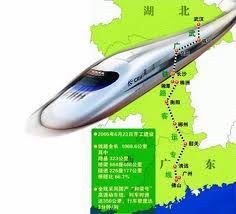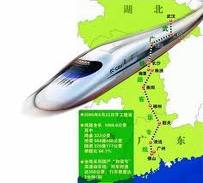
题目列表(包括答案和解析)





 I
I magine, one day,getting out of bed in Beijing and being at your office in Shanghai in only a couple of hours,and then,after a full day of work,going back home to Beijing and having dinner there.
magine, one day,getting out of bed in Beijing and being at your office in Shanghai in only a couple of hours,and then,after a full day of work,going back home to Beijing and having dinner there.
Sounds unusual,doesn't it? But it's not that unrealistic,with the development of China’s high-speed railway system.And that’s not all.China has an even greater high-speed railway plan — to connect the country with Southeast Asia,and eventually Eastern Europe.
China is negotiating to extend its own high-speed railway network to up to 17 countries in 10 to 15 years,eventually reaching London and Singapore.
China has proposed three such projects.The first would possibly connect Kunming with Singapore via Vietnam and Malaysia.Another could start in Urumqi and go through Kazakhstan and Uzbekistan,and possibly to Germany.The third would start in the northeast and go north through Russia and then into Western Europe.
If China’s plan for the high-speed railway goes forward,people could zip over from London to Beijing in under two days.
The new system would still follow China’s high-speed railway standard.And the trains would be able to go 346 kilometers an hour,almost as fast as some airplanes.
China’s bullet train(高速客车),the one connecting Wuhan to Guangzhou,already has the World’s fastest average speed.It covers 1,069 kilometers in about three hours.
Of course,there are some technical challenges to overcome.There are so many issues that need to be settled,such as safety,rail gauge(轨距),maintenance of railway tracks.So,it’s important to pay attention to every detail.
But the key issue is really money.China is already spending hundreds of billions of yuan on domestic railway expansion.
China prefers that the other countries pay in natural resources rather than with capital investment.Resources from those countries could stream into China to sustain development.
It’ll be a win-win project.For other countries,the railway network will definitely create more opportunities for business,tourism and so on,not to mention the better communication among those countries.
For China,such a project would not only connect it with the rest of Asia and bring some much-needed resources,but would also help develop China’s far west.We foresee that in the coming decades,millions of people will migrate to the western regions,where the land is empty and resources unused.With high-speed trains,people will set up factories and business centers in the west once and for all.And they’ll trade with Central Asian and Eastern European countries.
China’s new high-speed railway plan will be a win-win project because ________.
A.China will get much-needed resources and develop its western regions
B.China and the countries involved will benefit from the project in various ways
C.China will develop its railway system and communication with other countries
D.the foreign countries involved will develop their railway transportation, business and tourism
According to the passage,the greatest challenge to the new high-speed railway plan is ________.
A.technical issues B.safety of the system
C.financial problems D.maintenance of railway tracks
Which of the following words best describes the author’s attitude towards China’s high-speed railway plan?
A.Critical. B.Reserved. C.Doubtful. D.Positive.
Which of the following might be the best title for the passage?
A.New Railway Standards. B.Big Railway Dreams.
C.High-speed Bullet Trains. D.International Railway Network
One day in the early March of 1993, Pauline and Tom Nichter and their 11-year-old son, Jason, were shopping for a toy in Buena Park, CA. Suddenly, Pauline saw a wallet lying on the floor. When she looked inside, she found $200. The family, homeless and without work, knew that could change their lives. But they took the wallet to the nearby police station and turned it in. The wallet was found to have some other pockets, and more money in them—over $2,000! The police called the man who lost the wallet to pick it up. The man thanked the Nichters and shook their hands, but did not reward them. Luckily for the family, a TV news reporter filmed the story. People from all over the world heard the story and sent them letters, money, and even offered them jobs. A businessman even let them live in his house for free for six months. So far, the family has received over $100,000. Now the Nichters’ future is bright.
The best title for the passage would be “________”.
A. Money Is Everything B. A Lost Wallet and a Family
C. A Kind Businessman D. A Lost Wallet and the Police
Who found more money in the wallet?
A. The police B. Jason
C. Someone else in the shop D. The man who lost the wallet
The underlined words “reward them” mean “________”.
A. speak to the Nichters B. give something to the Nichters in return
C. pay the police D. meet the news reporters
People from all over the world help the Nichters do lots of things except _______
A.offere them jobs B.sent them letters
C.sent them money D.offere them clothes
Which of the following is TRUE about the Nichters?
A. They got lots of money from a reporter
B. They made friends with the wallet loser
C. They posted letters to people all over the world
D. They became known to many people
NEW YORK- One in five U.S. workers regularly attends after-work drinks with coworkers, where the most common mishaps range from badmouthing another worker to drinking too much, according to a study released on Tuesday.
Most workers attend so-called happy hours to bond with colleagues, although 15 percent go to hear the latest office gossip and 13 percent go because they feel necessary, said the survey conducted for CareerBuilder.com, an online job site. As to what happens when the after-work drinks flow, 16 percent reported bad-mouthing a colleague, 10 percent shared a secret about a colleague and 8 percent said they drank too much and acted unprofessionally. Five percent said they had shared a secret about the company, and 4 percent confessed to singing karaoke. While 21 percent of those who attended said happy hours were good for networking, 85 percent said attending had not helped them get closer to someone higher up or get a better position. An equal number of men and women said they attended happy hours with co-workers, with younger workers aged 25 to 34 most likely and workers over 55 least likely to attend. Overall, 21 percent of workers attend happy hours with co-workers and; of those nearly a quarter go at least once a month.
The survey was conducted online by Harris Interactive on behalf of CareerBuilder.com among 6,987 full-time employees between February 11 and March 13. Harris Interactive said the results had a sampling error of plus or minus 1.2 percentage points.
56. Harris Interactive made the survey to find out ________.
A. how U.S. workers spend their after-work time
B. what U.S. workers do at after-work drinks
C. the relationships between U.S. workers
D. who are most likely to attend after-work drinks
57. ________ of workers who attend after-work drinks speak ill of a colleague.
A. 4 percent B. 8 percent C. 16 percent D. 10 percent
58. According to the passage, most of those surveyed believed attending after-work drinks ________.
A. benefited them a lot B. could provide information
C. only made them relaxed D. was of no help to them
59. We can learn from the text that _________.
A. workers over 55 don’t like to attend happy hours at all
B. about 75% of workers go more than once a month
C. 10.5% of male workers attend happy hours with co-workers
D. about 700 workers surveyed shared a secret about a co-worker
60. After the survey, it can be inferred that_________.
A. all the workers oppose after-work drinks
B. the workers may change their attitudes towards after-work drinks
C. all the workers support after-work drinks
D. all the workers are suggested going to attend after-work drinks
Are some people born clever, and others born stupid? Or is intelligence developed by our environment and our experiences? Strangely enough, the answer to both these questions is yes. To some extent our intelligence is given us at birth, and no amount of special education can make a genius out of a child born with low intelligence. On the other hand, a child who lives in a boring environment will develop his intelligence less than one who lives in rich and varied surroundings. Thus the limits of a person's intelligence are fixed at birth, but whether or not he reaches those limits will depend on his environment. This view, now held by most experts, can be supported in a number of ways.
It is easy to show that intelligence is to some extent something we are born with. The closer the blood relationship between two people, the closer they are likely to be in intelligence. Thus if we take two unrelated people at random(随机地) from the population,it is likely that their degrees of intelligence will be completely different. If on the other hand we take two identical (完全相同的) twins they will very likely be as intelligent as each other. Relations like brothers and sisters, parents and children, usually have similar intelligence, and this clearly suggests that intelligence depends on birth.
Imagine now that we take two identical twins and put them in different environments. We might send one, for example, to a university and the other to a factory where the work is boring. We would soon find differences in intelligence developing, and this indicates that environment as well as birth playsa part. This conclusion is also suggested by the fact that people who live in close contact with each other, but who are not related at all, are likely to have similar degrees of intelligence.
Which of these sentences best describes the writer’s point in Para. 1?
A. To some extent, intelligence is given at birth.
B. Intelligence is developed by the environment.
C. Some people are born clever and others born stupid.
D. Intelligence is fixed at birth, but is developed by the environment.
It is suggested in this passage that_______.
A. unrelated people are not likely to have different intelligence
B. close relations usually have similar intelligence
C. the closer the blood relationship between people, the more different they are likely
to be in intelligence
D. people who live in close contact with each other are not likely to have similar degrees
of intelligence
In Para. 1, the word "surroundings" means_______.
A. intelligence B. life
C. environments D. housing

The best title for this article would be_______.
A. On Intelligence
B. What Intelligence Means
C. We are Born with Intelligence
D. Environment Plays a Part in Developing Intelligence
The first and best of victories is for a man to conquer himself; to be conquered by himself is, of all things, the most shameful,” says Plato. Self-control is at the root of all the advantages. Let a man give in to his impulses(冲动) and feelings, and from that moment he gives up his moral(道德) freedom.
A single angry word has lost many friends. When Socrates found in himself any temper or anger, he would check it by speaking low in order to control himself. If you are conscious of being angry, keep your mouth shut so that you can hold back rising anger. Many a person has dropped dead in great anger. Fits of anger bring fits of disease. “Whoever the gods would destroy they first make them mad.” “Keep cool,” says Webster, “anger is not argument.” “Be calm in arguing,” says George Herbert, “for fierceness(狂怒) makes error a fault.”
To be angry with a weak man is to prove that you are not strong yourself. “Anger,” says Pythagoras, “brings with folly and ends with regret.” You must measure the strength of a man by the power of the feelings he conquers, not by the power of those which conquer him.
Self-control is man’s last and greatest victory.
If a man lacks self-control he seems to lack everything. Without it he can have no patience, no power to govern himself; he can have no self-confidence, for he will always be controlled by his strongest feeling. If he lacks self-control, the very backbone and nerve of character are lacking also. (from www.nmet168.com)
1. What’s the main idea of the passage?
A. The importance of self- control. B. How to conquer oneself?
C. The relation between a man’s moral freedom and his feelings.
D. A man should keep cool.
2. What’s the meaning of “whoever the gods would destroy they first make them mad”?
A. If you are mad, the gods will kill you.
B. If you lose your temper first, gods will kill you first.
C. If you can’t control yourself, you will be crazy.
D. If the gods want to kill you, they will make you mad first.
3. Which of the following is NOT true, according to passage?
A. The first and best of victories is for a man to conquer himself.
B. You will make a small mistake serious if you don’t keep cool.
C. You must measure a man’s strength by the power of the feelings which conquer him.
D. Anger brings with folly and ends with regret.
4. Which of the following can’t help you avoid anger, according to the passage?
A. Be calm in arguing. B. Check your temper or anger by speaking low.
C. Keep your mouth shut. D. Try to make the other angry first.
湖北省互联网违法和不良信息举报平台 | 网上有害信息举报专区 | 电信诈骗举报专区 | 涉历史虚无主义有害信息举报专区 | 涉企侵权举报专区
违法和不良信息举报电话:027-86699610 举报邮箱:58377363@163.com